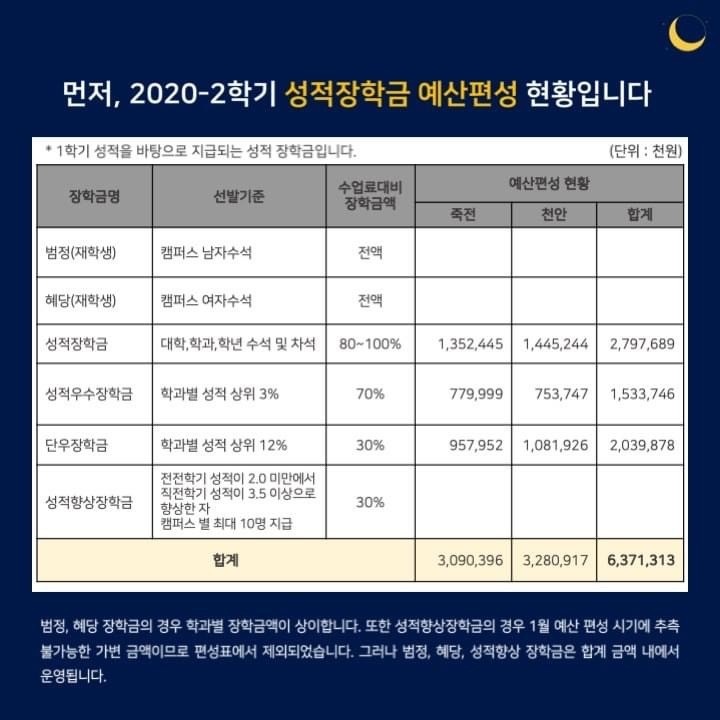Scholarship-related issues are a hot topic among Dankookians(students of Dankook University) ahead of the opening of the second semester of 2020. At Dankook University(DKU), the cost of running remote classes soared while the school experienced a corresponding financial deficit of billions of won due to vacancies in living quarters, the closure of lifelong education centers, and a sharp decline in enrollment of international students. Therefore, it has become difficult to maintain the existing academic scholarship system while at the same time, get the tuition refunds students were hoping for.
This year DKU announced the establishment of a ‘Special Disaster Support Scholarship’ to ease the tuition burden for students suffering from the academic program changes necessary due to impact of COVID-19. This plan returns 10% of tuition per person to about 21,000 eligible domestic students, making the total scholarship amount about 7.77 billion won. Those who are scheduled to graduate in August and those who are overdue for classes can receive a reduction through their accounts. In the case of those who are scheduled to register for the second regular semester, they will be notified of the reduction in tuition costs shortly. Student reaction and opinions of the policy plan are diverse.
Eight close consultations were held over a two-month period between DKU student representatives, the sub-committee on tuition review, and the full tuition review committee to discuss plans for a tuition refund. To raise monies for the program, February, DKU launched a ‘campaign to reduce their administration’s budget by 10 percent under an emergency management system. In addition, DKU secured funds for scholarships for students for international exchanges, student cultural events, and facility management, which were postponed or canceled due to emergency situations.
 |
| ▲ Status of budget for the second semester of 2020. (Photo from Facebook of Student Council) |
The university also decided that in the first semester all subjects with the exception of pass/fail classes, would be changed to absolute evaluation, and as a result, it was decided that merit based scholarship would not be issued. This is because it was believed that a fair evaluation of grades could not be achieved due to the confusion caused by remote lectures. Consequently, DKU decided to distribute the academic scholarship money evenly to all students.
Despite the efforts to communicate between all parties, students still have complaints about the school's handling of the situation. When COVID-19 hit and classes went online last semester, students staged a tuition refund protest. The student council received and communicated the opinions of the student body through collated surveys and meetings with university officials. But the abolition of the academic scholarship was something students did not expect. The student council secured budget data for the second semester academic scholarship, but they did not have comparable budget data for the first semester, so students do not know what the differences are between the previous and new scholarship funds. It would be easier to understand the financial situation of the school if all the numbers were put on the table for assessment. Another point of controversy is with the engineering, art, and physical education departments, which require practical classes, but will only receive 10% of their tuition refunded without exception. In those departments, students use laboratories, as well as normal classroom and believe they suffered more damage than students from other departments as a result of online earning. The controversy heated up as the schools and students shared their different positions.
The DKH interviewed a freshman from the department of electronic and electrical engineering that paid an extra laboratory fee last semester. He said “I’m sad that practical lessons have decreased as compared with previous semesters and that there is no mention of refunding laboratory fees despite the decline in practical lessons.” He also thought believed the 10% tuition return would not come out of the cancellation of grade scholarship, so students who received a scholarship last semester have a lot of complaints. He hopes that university will restore the academic achievement scholarship. He pointed out that Daejeon University cancelled their academic scholarships, but restored them later under pressure from students. If it is impossible, he hopes that the university returns more than the promised 10% tuition.
Next, the DKH interviewed a sophomore in the department of Political Science and International Relations that received academic scholarships in the past. At first, she was angry about the offer of a flat 10% return and cancellation of the merit based scholarship program, but on reflection she doubted that the old scholarship budget more than the new one. To be sure, she hoped the university would disclose any budget variances. She also had problems with the announcement being made so late. She spent her summer preparing for TOEIC and did not look for a part time job that would help her cover her tuition fees. In future she hopes they announce any plans for scholarships in a timely manner, including whether they intend to restore the previous merit-based plan. She worried about any criteria necessary to qualify for the 10% return in tuition as well as the application of an open and incorruptible process when deciding who qualifies for the tuition rebate scholarship. She hopes that with this additional information, students can better assess the universities tuition refund plan.
In this article we looked at the university’s response to student calls for tuition refunds. Although these are emergency measures, the school and students have conflicting opinions about the plans. Students need more detailed information to see if this in fact the best response to the lack of use of facilities and the decline the quality of education and both sides need to learn to compromise and coordinate their responses to new reality resulting from continued proliferation of COVID-19.
정소연, 류시은 dankookherald@gmail.com

![[Campus Magnifier] Let's Surf the Library!](/news/photo/202404/12496_1765_4143.jpg) [Campus Magnifier] Let's Surf the Library!
[Campus Magnifier] Let's Surf the Library!
![[Campus Magnifier] Let's Surf the Library!](/news/thumbnail/202404/12496_1765_4143_v150.jpg)





